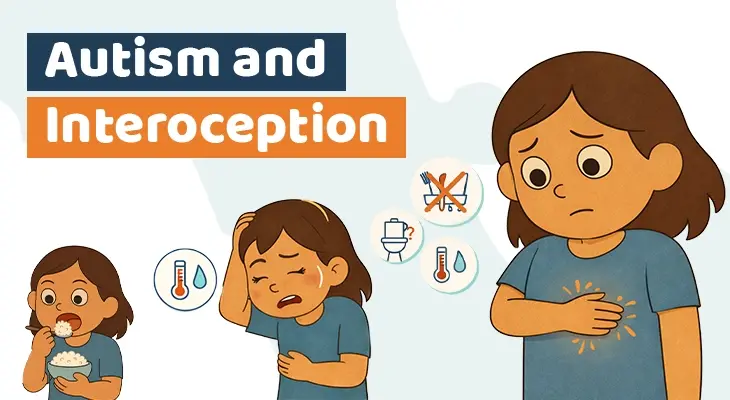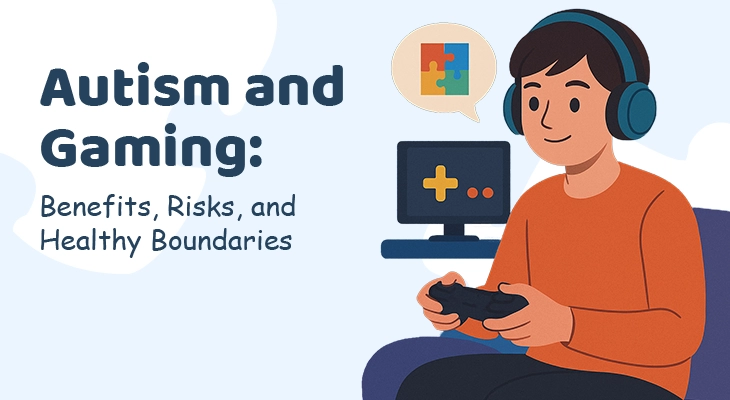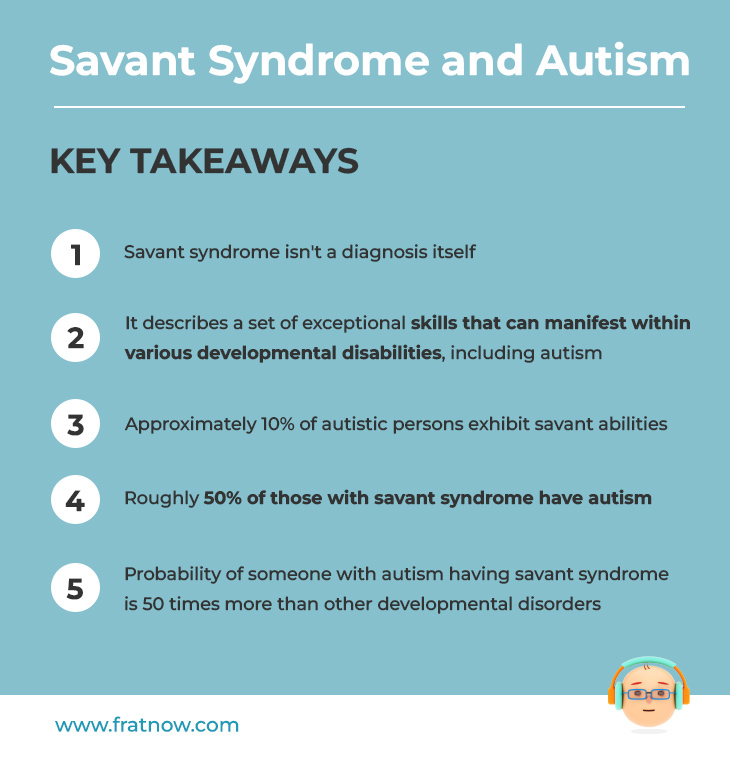
Download Download & share this Knowledge card in your network [Free Download]
What is savant syndrome?
Savant syndrome is a rare condition where individuals with developmental disabilities, such as autism, exhibit exceptional abilities in specific areas like music, math, memory, or art, which stand out in contrast to their overall cognitive limitations. Individuals with savant syndrome are popularly referred to as savants.
For example, a child with autism might have significant difficulty with everyday tasks like dressing themselves or communicating effectively, yet possess an extraordinary talent for playing complex classical music pieces on the piano, even after hearing them only once. This musical ability far surpasses what would be expected given their other cognitive skills.
It is important to note that savant syndrome is a rare condition that affects individuals with developmental disabilities or other central nervous system disorders. It does not occur in individuals with neurotypical development.
Savant Syndrome in Popular Culture: The Inspiration Behind "Rain Man"
One of the most famous portrayals of savant syndrome in popular culture is the 1988 film “Rain Man”[1], starring Dustin Hoffman. The film depicts Raymond Babbitt, a character with autism and savant syndrome, who possesses extraordinary mathematical and memory abilities.
Interestingly, the character of Raymond Babbitt was inspired by a real-life individual named Kim Peek[3]. Kim Peek, often referred to as the “megasavant,” was an American individual with exceptional cognitive abilities. He had a remarkable memory, could read two pages of a book simultaneously (one with each eye), and possessed a vast store of knowledge on various subjects. According to an article in The Times, he could accurately recall the contents of at least 12,000 books.[4]
The Wikipedia page on Savant Syndrome prominently features a photo of Kim Peek[2] and acknowledges him as the inspiration for the character of Raymond Babbitt in the film “Rain Man,” which went on to become the highest-grossing film of 1988 and received 8 nominations during the 61st Academy Awards[1].
The portrayal of Raymond Babbitt in “Rain Man,” though fictionalized, brought widespread attention to savant syndrome and helped to increase public awareness of this fascinating phenomenon.
In the following sections, we will delve deeper into the link between autism and savant syndrome, exploring the potential underlying mechanisms and the unique characteristics of this fascinating phenomenon.
Table of Contents
Facts About Savant Syndrome
Now that we’ve understood the fundamental aspects of savant syndrome, let’s delve deeper. Let’s explore the fascinating range of abilities seen in individuals with this rare condition.
What specific skills do savants often exhibit?
Generally, individuals with savant syndrome exhibit a single exceptional skill. However, in some cases, they may possess multiple savant abilities. Regardless of the specific skill, prodigious memory is a consistent hallmark of savant syndrome. Savant skills typically occur within a narrow range of abilities, generally falling into five main categories:
- Music: Usually performance, most often piano
- Art: Usually drawing, painting or sculpting
- Calendar calculating: Curiously an obscure skill in most persons
- Mathematics: Including lightning calculating skills or the ability to compute prime numbers, for example, in the absence of other simple arithmetic abilities
- Mechanical or spatial skills: Including the capacity to measure distances precisely without benefit of instruments, the ability to construct complex models or structures with painstaking accuracy or the mastery of map making and direction finding. A real life example here is of Kim Peek who in 1979, had accurately predicted that the plummeting Skylab space station would land near Perth, Western Australia.
Other skills that have been less reported include prodigious language (poly-glot) facility; unusual sensory discrimination in smell, touch or vision including synaesthesia; perfect appreciation of passing time without the benefit of a clock; and outstanding knowledge in specific fields such as neurophysiology, statistics or navigation. Hyperlexia, which is distinguished by precocity rather than age-independent level of skill, has also been frequently reported in autism. Read our blog Hyperlexia and Autism to know more on this subject.
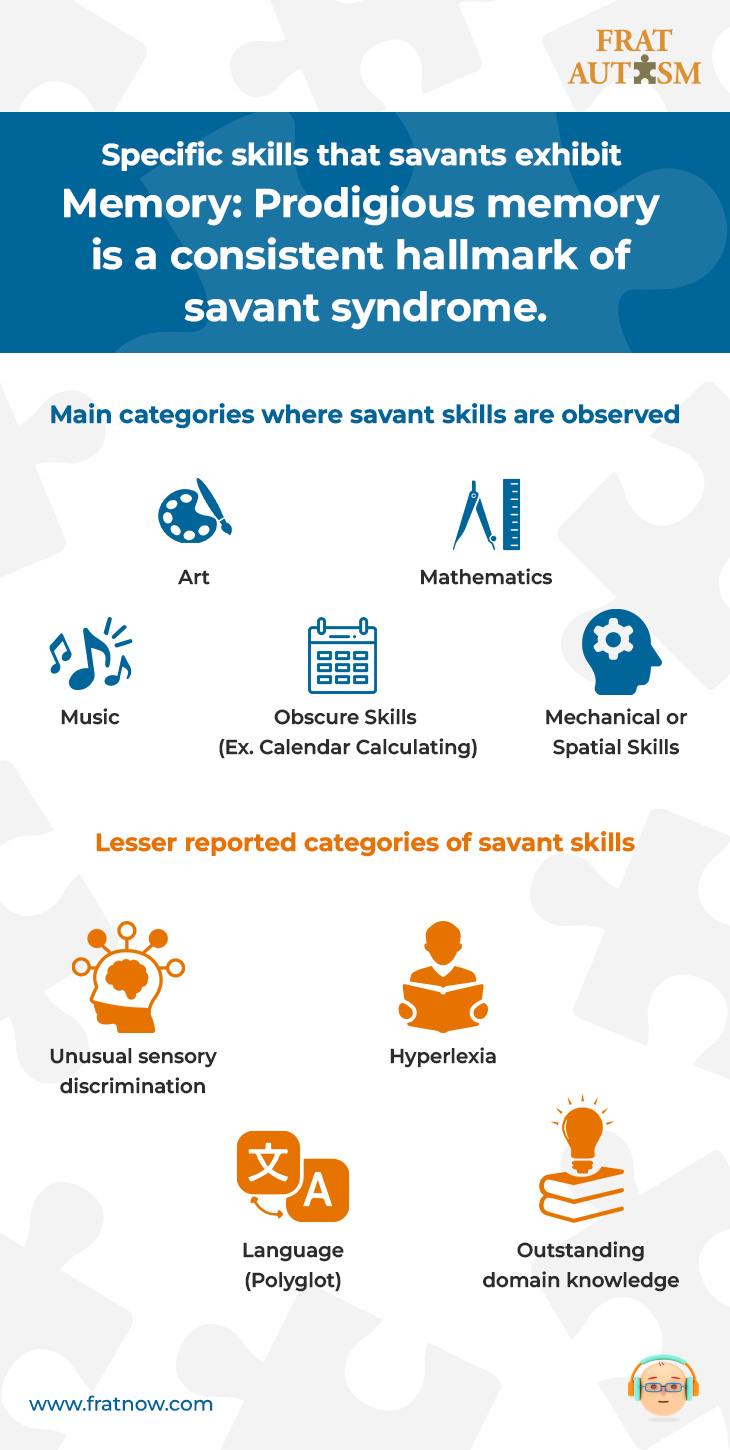
Download Download & share this infograph card in your network [Free Download]
What are the different levels of savant abilities?
Savant skills can vary significantly in their nature and extent. Here’s a look at the different levels of savant abilities:
- Splinter Skills: This includes obsessive preoccupation with, and memorization of, music and sports trivia, license plate numbers, maps, historical facts or obscure items such as vacuum cleaner motor sounds, for example.
- Talented Savants: Possess highly developed skills in a single area e.g.,. music, art etc.
- Prodigious Savants: Is a term reserved for those extraordinarily rare individuals whose special skill is so outstanding that it would be spectacular even if it were to occur in a non-impaired person.
Having explored the fascinating world of savant skills, let’s now delve into the significant link between savant syndrome and autism.
The Difference Between Autism & Savant Syndrome
It’s crucial to understand that savant syndrome isn’t a diagnosis itself; rather, it describes a set of exceptional skills that can manifest within various developmental disabilities, including autism. Therefore autism and savant syndrome are not the same. Think of autism as a vast landscape, and savant syndrome as a rare and dazzling flower that might bloom within it. While they can coexist, they are fundamentally different. And, while children with autism often exhibit narrow and intense interests, it’s crucial to distinguish these from the exceptional skills characteristic of savant syndrome. Let’s understand this difference with an analogy:
Imagine two children:
- Child A: Diagnosed with autism. Struggles with social interactions, prefers solitary activities, and has limited verbal communication. However, Child A has an exceptional memory for dates and historical events. This exceptional memory could be considered a savant skill.
- Child B: Diagnosed with autism. Also struggles with social interactions and has some repetitive behaviors. Child B has a focused interest in building blocks. He enjoys playing with building blocks and is quite skilled at creating complex structures. Child B does not exhibit any savant skills because their building skills are age-appropriate for their developmental level.
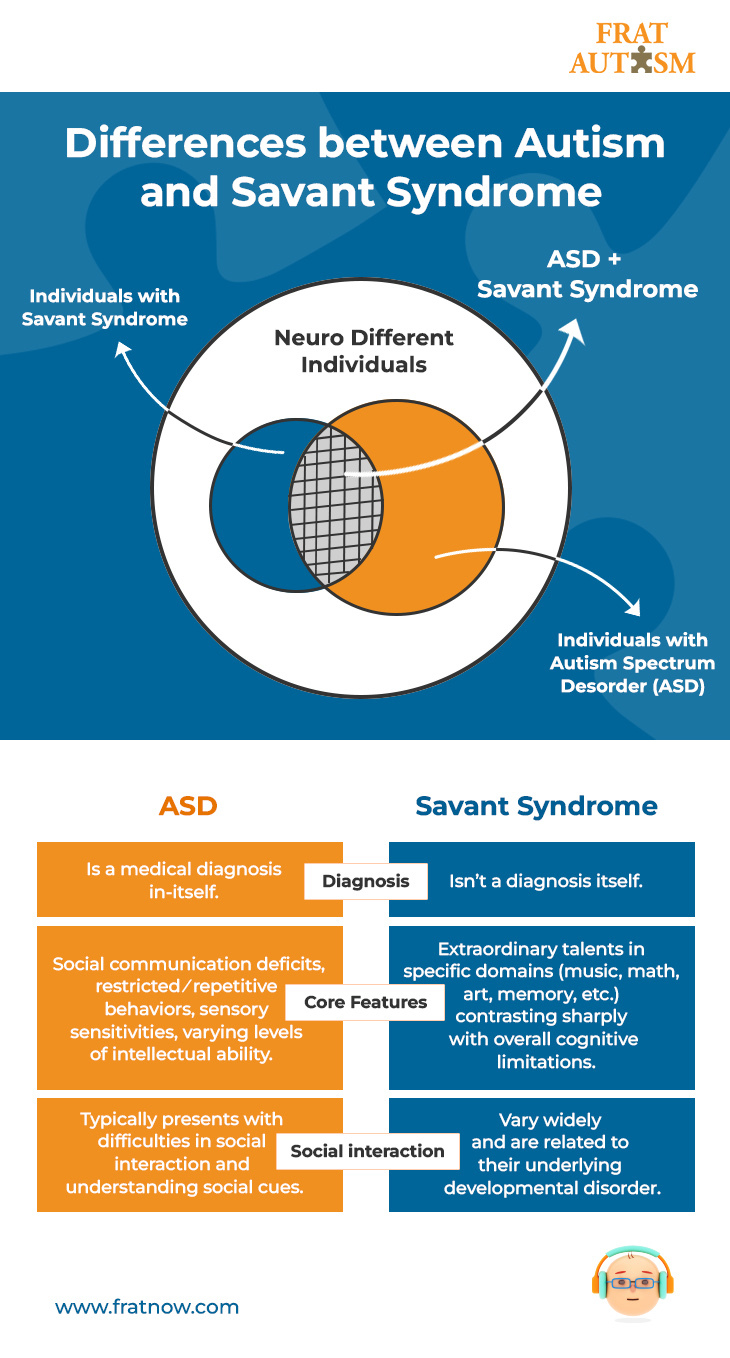
Download Download & share this infograph card in your network [Free Download]
How are Autism & Savant Syndrome Linked?
Research suggests a strong link between autism and savant syndrome. Let’s examine the evidence and explore the potential reasons for this connection:
- Overall, approximately 10% of autistic persons exhibit savant abilities. And in 2009 research involving 137 autistic people, as many as 37% showed either savant skills or unusual cognitive skills.
- Roughly 50% of those with savant syndrome have autism, and the remaining 50% have other forms of developmental disability.
Although precise figures are hard to come by, experts suggest that savant syndrome is about 50 times more likely to occur in individuals with autism than in those with other intellectual disabilities. This increased probability highlights a significant link between the two conditions.
While the exact reasons for this connection remain under investigation, several theories exist:
Atypical Brain Development
Both autism and savant syndrome are thought to be related to atypical brain development. In autism, this often manifests as challenges in social communication and repetitive behaviors. In some cases, these atypical brain patterns may also lead to the development of exceptional skills in specific areas, such as music, art, or mathematics. The same atypical brain development may be responsible for both conditions.
Focus on Detail
Individuals with autism often exhibit a strong focus on detail and a preference for structured patterns. This cognitive style may contribute to the development of savant skills, as it allows for intense focus and mastery of specific domains.
Interestingly, unlike the “Rain Man” character he inspired, Kim Peek wasn’t an autistic savant. Kim was born with FG Syndrome, a genetic condition, and lacked a crucial brain structure called the corpus callosum. Doctors believe his savant abilities may have developed as a result of the unique neural pathways that formed in his brain to compensate for this missing connection.
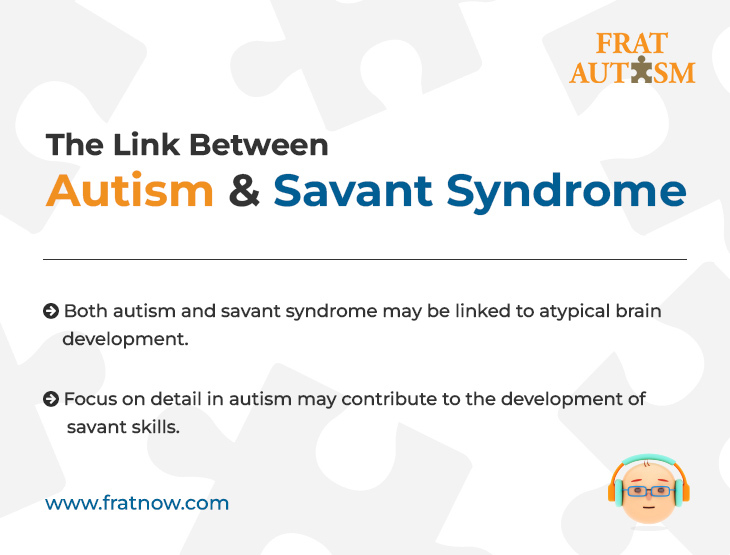
Download Download & share this infograph card in your network [Free Download]
Investigating Folate Deficiency in Children with Savant Syndrome
Since approximately 50% of individuals with savant syndrome are also diagnosed with autism, it’s important to recognize that autism can be accompanied by underlying conditions. One such potential factor is cerebral folate deficiency.
Folate Receptor Autoantibodies (FRAAs) can interfere with the brain’s ability to utilize folate, a crucial nutrient for brain development, particularly in areas related to cognitive function and neurodevelopment. Therefore, identifying the presence of FRAAs is important, especially in children exhibiting savant syndrome.
The FRAT® test can identify the presence of these autoantibodies. If the test is positive, indicating the presence of FRAAs, alternative folate forms like folinic acid may be considered under the guidance of your child’s healthcare provider.
To understand the impact of FRAT® testing and how it can benefit children with savant syndrome, let’s explore some key facts and a real-life success story.
FRAT® Test - Key Facts To Know
Of the 15,000+ individuals tested with the FRAT® test, a significant percentage showed positive results, indicating the presence of Folate Receptor Autoantibodies. Supplementation with alternative treatments like folinic acid has demonstrated improvements in quality of life for many of these individuals.
A FRAT® user’s TikTok video, sharing her child’s positive transformation following a positive FRAT® test result, went viral. Since its posting, the video has garnered an impressive 800K views, 79K likes, 27K shares, 33K bookmarks, and over 3K comments. Watch the video below:
@kyra2532 LIFE CHANGING updates for children with autism. #autismmom #childwithautism #autismresearch #autismfamily ♬ original sound - Kyra
Note: This video is only available in
regions where TikTok is available.
Over the years, more than 250 physicians have been prescribing the FRAT® Test, underscoring its growing recognition as a valuable diagnostic tool.
Here’s what Maxwell (Parent to an autistic child) has to say about the FRAT® test:

MAXWELL M.
Conclusion
Savant syndrome is a fascinating phenomenon that continues to captivate scientists and the general public alike. This rare condition presents a unique paradox – individuals with developmental challenges exhibiting extraordinary abilities in specific domains.
Our exploration has delved into the key aspects of savant syndrome, from its defining characteristics to the intriguing link with autism. We’ve also explored the various categories of savant skills, showcasing the remarkable range of talents that can manifest in individuals with this condition.
While significant progress has been made in understanding savant syndrome, many questions remain unanswered. The exact mechanisms underlying the development of savant skills are still being explored. Further research is needed to unravel the complex interplay between brain development, cognitive styles, and environmental factors that contribute to this remarkable phenomenon.
Savant syndrome serves as a powerful reminder of the vast spectrum of human potential. It highlights the beauty of neurodiversity and the unique strengths that can emerge from atypical brain development. We hope this blog has enlightened you about this remarkable condition.
References
- Wikipedia, Rain Man
- Wikipedia, Savant Syndrome
- Wikipedia, Kim Peek
- The Times: Kim Peek: savant who was the inspiration for the film Rain Man
- National Library of Medicine, The savant syndrome and autistic disorder
- The Royal Society, Savant skills in autism: psychometric approaches and parental reports

